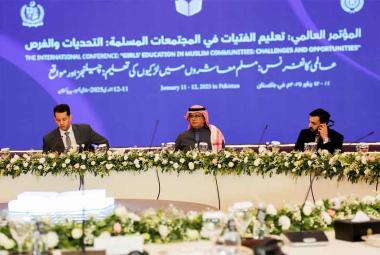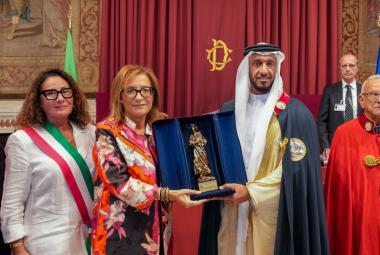Jeddah (UNA) - Under the generous auspices of the Custodian of the Two Holy Mosques, King Salman bin Abdulaziz Al Saud, the "International Conference on Women in Islam (Status and Empowerment)" commenced on Monday, November 6, 2023.
The Conference is organized by the General Secretariat of the Organization of Islamic Cooperation and hosted by the Kingdom of Saudi Arabia in the city of Jeddah.
The inauguration ceremony of the Conference began with a speech by Prince Faisal bin Farhan bin Abdullah, the Saudi Minister of Foreign Affairs. In his speech, Prince Faisal thanked the participating delegations for accepting Saudi Arabia's invitation to hold this important Conference on women in Islam.
He mentioned, "The various and compounded challenges faced by women in regions of conflict and armed conflict, including violence, poverty, fear, marginalization, and the lack of healthcare and educational opportunities for their children, necessitate serious action to protect and support these most vulnerable and weakened groups."
"Today, we meet in the midst of challenging circumstances that the Palestinian women in Gaza are enduring under continuous Israeli violations of international laws and humanitarian principles. This occurs in the context of the international community's silence and indifference regarding fulfilling its duties and responsibilities to stop the escalation, save lives, and ensure immediate access to necessary humanitarian aid."
The Saudi Foreign Minister expressed the Kingdom's strongest condemnation of what Palestinian women and the entire Palestinian people face in terms of illegal violations and crimes against humanity by the Israeli war machine. He commended the Palestinian women's pivotal role and significant sacrifices in pursuing their just cause.
"Muslim women face numerous challenges, harassment, and discrimination in some other countries due to a wave of restrictive legislation on their rights, especially in wearing the hijab and other matters due to Islamophobia," Prince Faisal said, noting that these restrictions contradict the Convention on the Elimination of All Forms of Discrimination Against Women, adopted by the United Nations General Assembly in 1979.
He emphasized that the Kingdom has taken significant and rapid steps to empower women under the ambitious Vision 2030, making Saudi women an essential and indispensable partner in the journey of transformation, development, and growth across various fields.
At the conclusion of his speech, the Saudi Foreign Minister announced the official document of the Conference titled "The Jeddah Document on Women's Rights in Islam," which will cover the rights of women in Islam comprehensively. It will serve as a legal, legislative, and intellectual reference document contributing to achieving empowerment as a living reality in our Islamic societies.
On her part, the Prime Minister of the People's Republic of Bangladesh, Sheikh Hasina, acknowledged the Kingdom of Saudi Arabia's pioneering initiatives to promote women's participation under the leadership of the Custodian of the Two Holy Mosques, King Salman bin Abdulaziz, and Crown Prince Mohammed bin Salman.
She emphasized that women are at the forefront of social development efforts in Bangladesh and noted that there are currently 73 women in parliament.
The Prime Minister condemned the crimes and atrocities committed by the Israeli occupation against women and children in Gaza and called on all parties to ensure humanitarian protection and assistance, as well as an immediate ceasefire in Gaza. She also urged an end to this heinous war and the unlawful occupation against Palestinians.
Mohamed Salem Merzoug, the Mauritanian Minister of Foreign Affairs, stated that the Conference reflects the vision of the Kingdom, led by the Custodian of the Two Holy Mosques and Crown Prince Mohammed bin Salman, regarding significant issues of the Islamic nation. He commended Saudi leadership's commitment to protecting legitimate rights and freedoms that align with our Islamic values, strengthening societal security and promoting harmony and integration among all its members.
He noted that the presence of women in public life is increasing in our Islamic world due to the rising rates of girls' education. This increase has opened doors for women to enter various fields that were previously restricted to men.
The Minister, on behalf of the Islamic Republic of Mauritania, expressed his solidarity with Palestinian women in light of the recent acts of blind violence and heinous assaults perpetrated by the Israeli occupation forces.
He stressed that these acts are a clear violation of ethical standards and international agreements.
Hissein Brahim Taha, the OIC Secretary-General, stated that this Conference comes at a time when the Palestinians are facing brutal Israeli aggression, and women, particularly Gazan women, as well as children, older people, and other innocent civilians, are among the victims of this bombing.
He stressed that the situation in Gaza is a continuing tragedy that places everyone before significant responsibilities that impose themselves on the deliberations of the Conference and urges intensified efforts to expose this Israeli barbarism and defend the rights of Palestinian women, the Palestinian people, and the blessed Al-Aqsa Mosque.
The Secretary-General also affirmed the OIC's determination to continue constructive dialogue to empower Afghan women and guarantee their right to access education at all levels and participate in public life.
On behalf of the African group within the OIC, Vice President of Benin, Mariam Chabi Talata, affirmed the importance of the Conference and commended the efforts of the Saudi leadership in hosting it.
She also acknowledged the Conference's plans to adopt a comprehensive and agreed-upon document regarding women's rights in Islam, emphasizing that this is highly important and will benefit women and the world.
Retno Marsudi, the Indonesian Minister of Foreign Affairs, speaking on behalf of the OIC Asian group, stated that progress has been made in promoting women's rights in the Islamic world. However, she noted that challenges still exist concerning women's inclusion.
She proposed a better understanding of the significance of women's rights in the economy, emphasizing that women's full and effective participation is crucial for achieving sustainable development and that economic empowerment of women increases economic productivity.
Marsudi called upon OIC experts to ensure the protection of women's rights in Afghanistan and to reopen the path to education for Afghan women and all aspects of Afghan society, which will lead to significant and vital results in Afghanistan's recovery.
She strongly condemned the brutal Israeli actions against women and children in Gaza and stressed the necessity of ending the violence, facilitating humanitarian aid, and protecting women and children.
Dr. Saleh bin Abdullah bin Humaid, the President of the International Islamic Fiqh Academy, said that 14 centuries ago, Islam established valuable principles, solid foundations, and cohesive systems to create an exceptional human society. Its members cooperated on righteousness, piety, and the building of nations, promoting humanity and enhancing individuals through a solid regulation of rights and duties and formulating areas for cooperation, integration, and solidarity.
Amina J. Mohammed, the Deputy Secretary-General of the United Nations, stated on behalf of the UN Secretary-General that Islam has recognized women's rights from the beginning, allowing them to participate in political decision-making and to have their own properties and businesses. However, in many countries, women have been left behind.
She emphasized the importance of providing education for all, especially women and girls worldwide, in line with the principles of the Islamic faith. She noted that Islam calls for ending all discriminatory laws and practices that hinder access to education. Nevertheless, there are currently 130 million girls out of school worldwide.
In this regard, the UN Deputy Secretary-General highlighted the challenges faced by Afghan girls in continuing their education.
Dr. Maya Morsy, the President of the National Council for Women in Egypt, stated that the Conference reaffirms the commitment of OIC member states to promote women's status, protect their rights, and empower them during times of peace, war, and conflict.
She announced Egypt's plans to host an international conference on investing in religious and media discourse and its impact on women's protection and rights in cooperation with the UN next year.
Morsi strongly condemned the human rights violations experienced by Palestinian women, especially the forced displacement of Gaza residents and attempts to liquidate the Palestinian cause.
She called on the United Nations to demand an immediate and sustainable ceasefire in Gaza without conditions for the sake of humanity, including by ensuring continued, rapid, safe, and sustainable access to the Gaza Strip and providing special protection for women, children, and civilians.
Dr. Afnan Al-Shuaibi, the Executive Director of the Women Development Organization, stated that this international Conference marks a turning point for Muslim women worldwide.
Al-Shuaibi emphasized that the tolerant teachings of Islam came to honour and value women as highly valued human beings.
The Conference will continue for two days on November 7 and 8, where ministers, officials, scholars, and thinkers will discuss the status and rights of women in Islam, prospects for the empowerment of Muslim women in education and employment, as well as various issues related to women in contemporary societies.
Photo Credit: Saudi Press Agency







